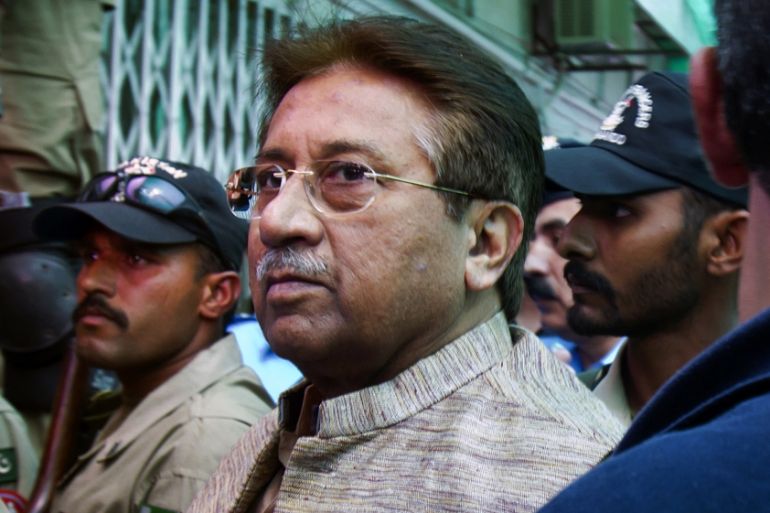Pakistan ex-President Pervez Musharraf challenges death sentence
Petition filed said judge’s observation ‘crossed all religious moral, civil and constitutional limits’.

Former Pakistan president and army chief Pervez Musharraf has submitted a petition in Lahore High Court challenging the death sentence handed to him in a treason case earlier this month.
According to local media, the petition highlighted that the “judgement contained a mix of anomalies and contradictory statements” and that the special court “rapidly and hurriedly wrapped up the trial which was far from conclusion”.
Keep reading
list of 3 itemsMusharraf allowed to fly to Dubai for back injury care
Pervez Musharraf: ‘A politicised vendetta’
A special court convicted Musharraf and sentenced him to death on December 17 on charges of high treason and subverting the constitution – an unprecedented verdict in a country that has been ruled by its powerful military for roughly half of its 72-year history.
|
|
The detailed judgement, published days after Musharraf’s sentencing was announced, also called for the former president’s corpse to be displayed outside the parliament building.
“And if [Musharraf is] found dead, his corpse be dragged to the D-Chowk [in front of Pakistan’s parliament building], Islamabad, Pakistan, and be hanged for three days,” Justice Waqar Seth, one the three judges who presided over the case, wrote in his verdict.
The petition, filed on Friday, condemned Seth’s observation, highlighting that “the Honourable respective president of the special court has crossed all religious moral, civil and constitutional limits, while ruthlessly, irreligiously, unlawfully, unrealistically awarding a debilitating, humiliating, unprecedented and against the dignity of a person sentence”.
Last week, the government announced it would be filing a reference against Seth, who is also the chief justice of the Peshawar High Court, for his observations.
Federal Minister of Law and Justice Farogh Naseem termed the verdict “unprecedented and despicable”.
Musharraf fled to the United Arab Emirates in 2016 and has remained in self-imposed exile, refusing to attend court hearings.
‘Baseless’
In a video released from a hospital bed in Dubai earlier this month, the former military ruler termed the charges against him “baseless”.
After retiring as army chief and transitioning to a purely political role, Musharraf saw his party decimated in a 2008 general election.
The polls had come after widespread protests the year before, following his unsuccessful attempt to remove then-Supreme Court Chief Justice Iftikhar Chaudhry.
As anti-government demonstrations spread across the country, Musharraf declared a state of emergency on November 3, 2007, suspending the constitution, deploying the army and taking direct control of the country.
The charges against him at the special court, which were filed in 2014, focused on the November 2007 imposition of emergency law.